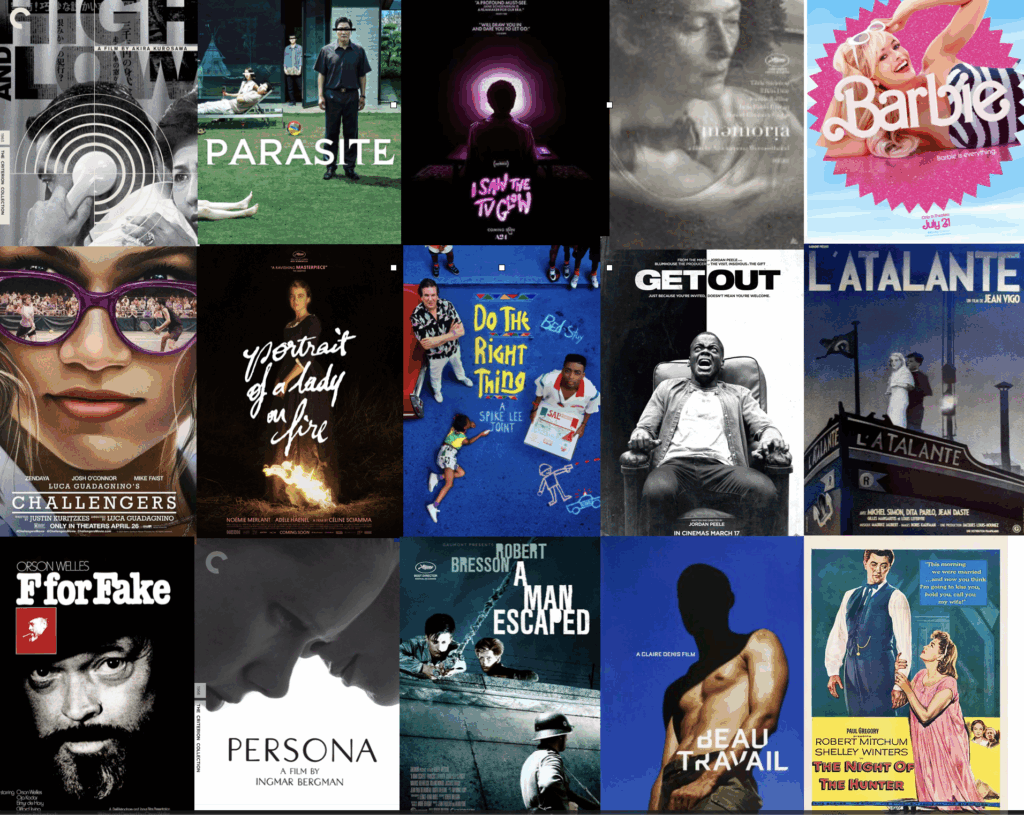MDST3510: How To Watch Movies
Professor Sean Duncan (sean.duncan@virginia.edu)
Meets 2:00PM – 4:30PM Wednesdays in 368 New Cabell Hall
How do we understand cinematic form, and how does that help us to understand how films create meaning?
In this Topics in Media Research course, we will focus in-depth on one particular approach to film studies — formal film analysis. We will repeatedly practice the analysis of film, with a focus on its component, formal elements: mise-en-scène, cinematography, sound, editing, and other constructive elements of film production.
We will take a particularly hands-on approach to this topic, and attempt to practice formal analysis on a perhaps-dizzyingly wide range of films from the 1910s to the present day. Tracking the evolution of filmic techniques, technologies, and movements will be our secondary focus, and we will sample widely from the extensive international history of film.

The final list of films has not yet been determined but the images above are all in consideration. We will strive to engage with a wide range of films, even if we cannot be exhaustive of all important filmmakers and all important movements. Instead, our goal will be to find useful films that allow us to start conversations about their formal elements. Films will be chosen to be assigned in full or in excerpts throughout the term based on their formal qualities, but we will attempt to provide a selection that cuts across many national film cultures and a range of films created by a wide range of filmmakers.
Building an expansive set of film literacy is a goal of the course, however, though we assume nothing going in. Zero experience with film or film history is required for this course — just an eagerness to watch (a lot!) and to hone one’s skills in analyzing them! Students will be guided into how to watch films for this class, as well as incentivized to watch films in local theatrical exhibition environments. Beyond just focusing on a method for media studies, “how to watch movies” will ideally help students see film in a new light, and guide toward new ways of attending to media more broadly. We will encourage students to seek out new and recent films to bring into course discussions, and we will regularly push ourselves to engage more fully with online discussions about film analysis and the film industries.
Since this course occupies a 2 1/2 hour long, once-per-week scheduling block, we will use this extended meeting time to practice collaborative viewing in the classroom, each and every week. We will devote class time to the practice of watching and developing formal understandings of each film or film excerpt shown in class as well as communicating arguments about them. Additionally, each week will have multiple assigned films — a “primary screening” as well as a “secondary screening,” at least one of which will need to be watched in detail by each student, each week. Our class sessions will involve both discussion and group interpretation of assigned films, and will be held in a UVA active learning space to facilitate these activities.
There will be no exams in this course. Student work will be assessed in several other ways, including short written papers, in-class writing, and short video essay assignments. Occasional pop quizzes may be assigned to motivate students to watch each assigned film, and carefully.
The course will be specifications-graded (no letter or numerical grades will be assigned), with revision opportunities available for most assignments. There will be no final examination assigned for this course, though students will be tasked with completing a final formal analysis of a film of their choosing in either written or video essay form.
If you have any questions about this or any other course (or anything else on this website), please don’t hesitate to email Dr. Duncan at sean [dot] duncan [at] virginia.edu.
